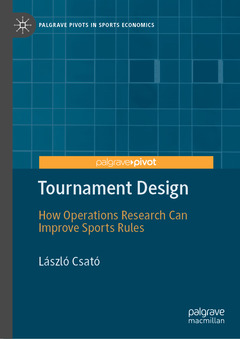Tournament Design, 1st ed. 2021 How Operations Research Can Improve Sports Rules Palgrave Pivots in Sports Economics Series
Auteur : Csató László

This Palgrave Pivot presents tournament design mainly within the axioms of incentive compatibility and fairness. It illustrates the advantages of an axiomatic approach through various examples, including several FIFA and UEFA tournaments, and uses theoretical tools and simulation methodology in its analysis. Chapter 1 discusses scoring systems of championships with multiple competitions, ranking in Swiss-system tournaments, and tie-breaking rules in round-robin leagues. It is followed by a thorough critical analysis of the current and previous FIFA World Rankings. The broad focus is substantially narrowed in Chapter 2, which turns to the topic of incentive (in)compatibility in multiple qualifiers. It is revealed that UEFA has faced at least three times recently this problem in the qualification to the UEFA Europa League, qualification to the UEFA Champions League, and the draw of the UEFA Champions League groups. Analogously, Chapter 3 discusses incentive (in)compatibility when there is only one group-based tournament but the complex progression rules to the subsequent stage can be designed poorly. Our examples include the qualifying tournaments of recent FIFA World Cups and UEFA European Championships. Chapter 4 moves to the problem of penalty shootout rules in soccer, where the fairness and complexity of some alternative mechanisms from the literature are evaluated. Fairness remains the central issue in Chapter 5, which presents the challenges of designing a tournament with 24 teams if the number of teams per group cannot exceed four. As expected, there is no perfect solution, and both FIFA and UEFA have introduced a reform in this format recently. Chapter 6 deals with the qualification for the 2020 UEFA European Football Championship. Its tournament design is perhaps the most complicated one that has ever been implemented in the real-world and suffers from serious shortcomings.
Brings operations research into the realm of sports and sports economics
Looks at a number of paradoxes in sports ranking, with an emphasis on tying them to real sports leagues and their decisions
Balances theoretical tools, simulation methodology, and practical applications
Date de parution : 01-2021
Ouvrage de 154 p.
14.8x21 cm
Disponible chez l'éditeur (délai d'approvisionnement : 15 jours).
Prix indicatif 58,01 €
Ajouter au panierThème de Tournament Design :
Mots-clés :
Tournament Design; Sports Economics; Operations Research; Game Theory; Applied Economics
